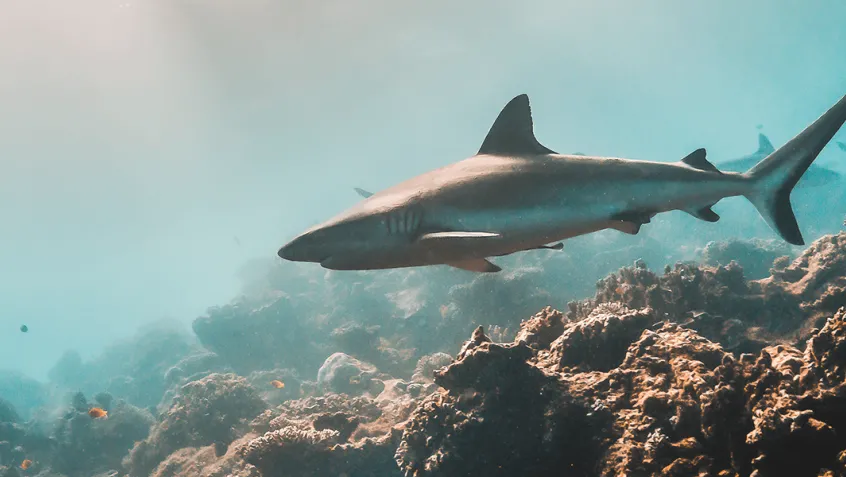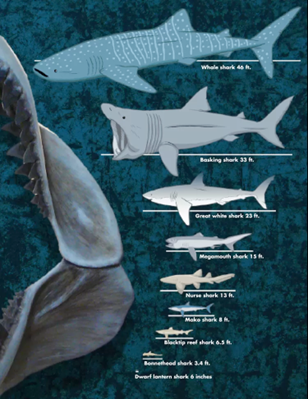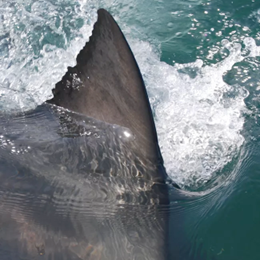
Shark Week returns on July 24. This unofficial holiday debuted in 1988 and is now TV's longest-running programming event.
The jury is still out on whether Shark Week has improved the public's perception of sharks. Researchers at Allegheny College found that over 50% of Shark Week episodes contained negative images of sharks or negative statements about sharks. At the same time, more than half of the programming also mentioned the importance of shark conservation.
Shark Fact Versus Fiction

Sharks have long suffered from a bad rap, thanks to infamous Hollywood depictions and unfair stereotypes. In reality, you are more likely to be struck by lightning than die from a shark attack.
How many of these misconceptions have you heard?
- Myth: Sharks prey on humans. Fact: Most sharks eat small fish and invertebrates. Only three species of sharks are responsible for the majority of bites to humans—most occurring when sharks are confused.
- Myth: All sharks are big, aggressive, and have razor-sharp teeth. Fact: The more than 500 species of sharks vary widely in appearance; the largest shark species, the whale shark, is a “filter feeder” known for having a docile disposition.
- Myth: Sharks have to keep swimming to survive. Fact: While some species need to keep swimming to keep oxygen flowing past their gills, other species can rest on the ocean floor and still "breathe.”
- Myth: Shark fins grow back if they are cut off. Fact: A “finned shark” (which has had its dorsal fin removed and the still-living body dumped back into the water) often will not survive the process.
- Myth: Humans are no threat to sharks. Fact: Sharks have much more to fear from us than we do from them. Humans kill millions of sharks each year, intentionally and as fishery bycatch. A 2014 study estimated that one-quarter of the world's sharks and rays are at risk of extinction.
As an apex predator, sharks are an important part of the ocean ecosystem. If too many sharks are removed, too many prey are able to survive, shifting the food web. Sharks are found in just about every kind of ocean habitat. That means that shark conservation is important for ecosystems around the globe.
Learn About Sharks in the National Parks
Many species of sharks can be found in coastal national parks. Park scientists study sharks to learn about their role in ocean health. They continue to discover new information about this fascinating and enigmatic fish.

In 2021, researchers published the first study of great white shark populations off the central coast of California. They collected more than 1,500 white shark dorsal fin photos at three white shark gathering spots including Tomales Point at Point Reyes National Seashore.
Understanding this species is especially critical because white sharks can live more than 70 years but reproduce slowly. Fishing and poaching can dramatically impact their populations.
Want to learn more about sharks in our national parks and shark conservation? Below are five parks with active shark populations.
Cape Cod National Seashore, Massachusetts
Cape Cod is a wild marine ecosystem known for its population of great white sharks.
Channel Islands National Park, California
Researchers are tracking basking sharks at this park to better understand where these mysterious sharks go and what kinds of habitats they use.
Dry Tortugas National Park, Florida
You might see a nurse shark, known as the "couch potato" of the shark world while snorkeling here.
Glacier Bay National Park and Preserve, Alaska
Learn about Tinglit culture at the Huna Tribal House. Sharks serve as the primary crest of the Wooshkeetaan clan.

Point Reyes National Seashore, California
Over 130 species of fish have been recorded at Point Reyes, including the sixgill shark, sevengill shark, and great white shark.
Share the Ocean With Sharks
Sharks are a normal and important part of the natural surroundings we enjoy at the beach. While shark encounters are unlikely, it's smart to take some extra precautions when visiting a coastal area that may be home to sharks.
- Don't swim too far from shore.
- Stay in groups.
- Avoid being in the water during darkness or twilight, when sharks are most active.
- Avoid areas where seals or schools of fish are present.
- Avoid murky or low-visibility water.
- Follow all signage and flag warnings at beaches and instructions of lifeguards and park rangers.
How to Teach Kids About Shark Science
There is still so much we don't know about sharks. Perhaps your child will make new shark conservation discoveries as a future shark scientist or marine biologist! Incorporate sharks into your curriculum in the classroom or at home with these STEM resources for kids.
- The California State University, Long Beach Shark Lab offers free, virtual K-12 live education programs that use sharks and technology as a way of getting students interested in STEM. Learn about shark biology and the technology used to study sharks with their online resources or request a live presentation by an instructor.
- Watch “Sharks & Shorelines” from PBS for a standards-based lesson for grades 3-12 about why and how researchers are tagging and tracking sharks in coastal ecosystems.
- The Florida Museum offers a variety of free lesson plans and activities to help raise awareness about sharks, including a fact or fiction quiz.
- Classrooms can loan the shark-themed “traveling trunk” from North Carolina's Cape Lookout National Seashore. It contains a variety of classroom activities to introduce students to the biology and behaviors of sharks.
- Get transported to the ocean's depths while watching live shark webcams hosted by the Aquarium of the Pacific, Georgia Aquarium, Monterey Bay Aquarium, and the Oregon Coast Aquarium.


